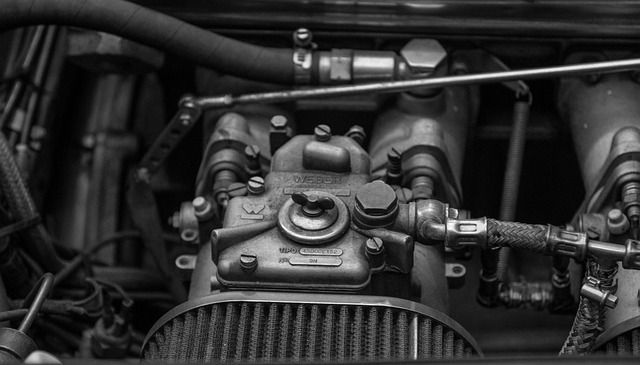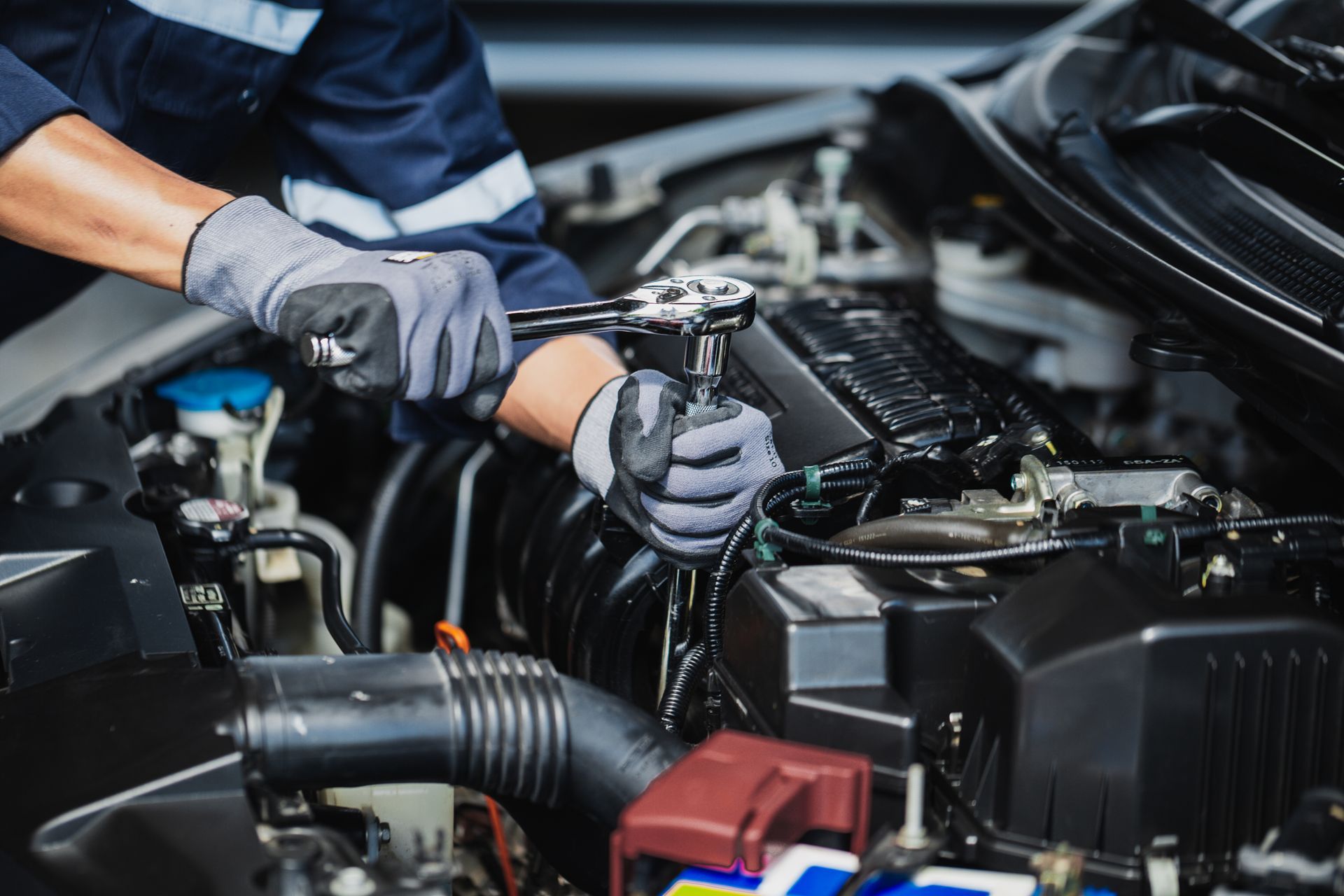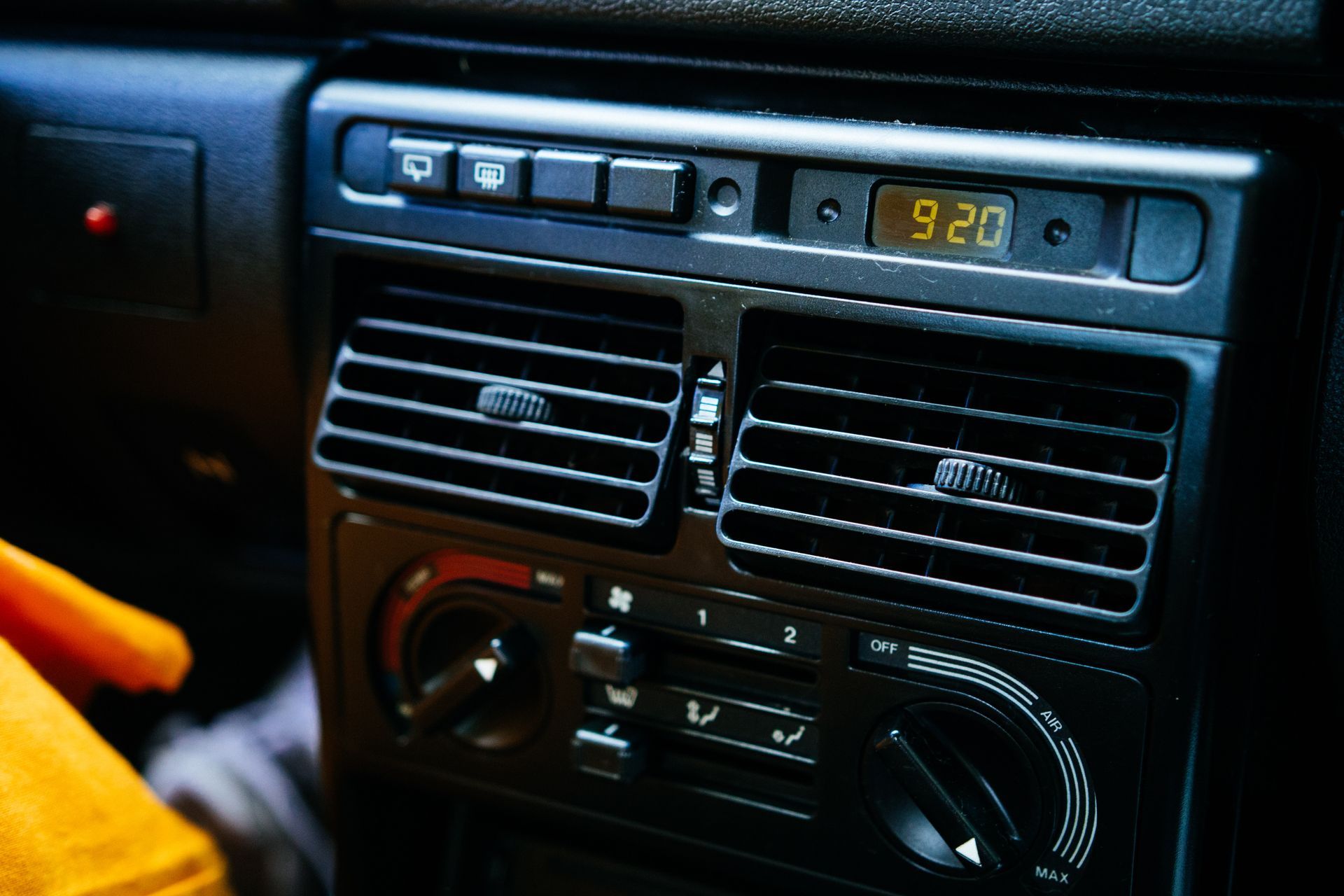Our Blog
Discover top-notch auto air conditioning services at Bock Automotive in Pequannock, NJ. Stay cool this summer with our trusted expertise. Schedule an online appointment now!

When it comes to maintaining your vehicle in Pequannock Township, few choices are as important as the type of oil you use. At Bock Automotive, we frequently field questions from local drivers about the differences between synthetic and conventional oil. Is the premium price of synthetic worth it? Does your specific vehicle really need it? Today, we're breaking down everything Pequannock Township drivers need to know to make an informed decision about the lifeblood of their engines. Understanding the Basics: What's the Difference? Conventional Oil Conventional motor oil (sometimes called mineral oil) is: Refined directly from crude oil Less processed than synthetic alternatives The traditional choice for many decades Generally less expensive per quart Still widely used in many vehicles on Pequannock Township roads Synthetic Oil Synthetic oil is: Chemically engineered and manufactured Refined, distilled, and broken down into basic molecules Designed with uniform molecular structure Enhanced with additives for specific performance benefits Increasingly recommended by manufacturers of vehicles we service at our Pequannock shop Synthetic Blend Oil There's also a middle option that many Pequannock Township drivers choose: Combines conventional and synthetic oils Offers some benefits of synthetic at a lower price point Often recommended for older vehicles in our variable New Jersey climate Key Performance Differences When driving through Pequannock Township's varied conditions – from summer heat on Route 23 to winter cold snaps – the type of oil in your engine can make a significant difference in performance. Temperature Performance Cold Weather Performance: Northern New Jersey winters can be harsh, with temperatures occasionally dropping well below freezing. In these conditions: Conventional oil thickens significantly, flowing sluggishly on cold starts Synthetic oil maintains better viscosity at low temperatures, providing faster engine protection when starting your car on those frigid Pequannock Township mornings This difference can be crucial for engine longevity, particularly if you park outdoors during winter months Hot Weather Performance: During Pequannock's hot summer days: Conventional oil breaks down faster at high temperatures Synthetic oil maintains stability and protection even in extreme heat This becomes important when stuck in summer traffic heading to nearby shopping in Wayne or commuting to Newark Longevity and Change Intervals One of the most significant practical differences that affects Pequannock Township drivers is how often you'll need to visit us for oil changes: Conventional oil typically requires changes every 3,000-5,000 miles Synthetic oil often extends that interval to 7,500-15,000 miles (depending on manufacturer recommendations) For busy Pequannock Township residents, fewer oil changes means less time spent on maintenance and more time enjoying everything our area has to offer. Engine Protection and Cleanliness The molecular uniformity of synthetic oil provides measurable benefits: Reduced friction and wear on engine components Better resistance to oil breakdown and sludge formation Superior cleaning properties to prevent deposits Enhanced protection against the stop-and-go driving common in our area Cost Considerations for Pequannock Township Drivers The price difference between oil types is significant, but requires looking beyond the immediate cost: Average Local Price Comparison: Conventional oil change: $35-$55 Synthetic blend oil change: $45-$70 Full synthetic oil change: $65-$125 But consider the total operating costs: Extended change intervals mean fewer synthetic oil changes per year Potential reduction in engine wear may lower long-term repair costs Possible slight improvements in fuel economy Potential for extended engine life, particularly important with today's complex engines For many Pequannock Township drivers, the additional upfront cost of synthetic oil is offset by these long-term benefits. Which Vehicles Need Synthetic Oil? Manufacturer Requirements Many newer vehicles require synthetic oil, including: Most European imports we service (Mercedes-Benz, BMW, Audi) Many vehicles with turbocharged or supercharged engines High-performance vehicles Most recent model year vehicles At Bock Automotive, we always adhere to manufacturer specifications for the vehicles we service in Pequannock Township. Vehicles That Benefit From Synthetic (Even If Not Required) Even if not specifically required, these scenarios make synthetic oil a wise choice for local drivers: Vehicles primarily used for short trips around Pequannock Township (synthetic oils reach protective viscosity faster) Older, high-mileage vehicles that need extra engine protection Vehicles subjected to extreme conditions (towing, frequent mountain driving in nearby areas) Cars that experience extended periods of idling (such as during winter warm-ups) Special Considerations for Pequannock Township Drivers Our local driving conditions present unique challenges that affect your oil choice: Seasonal temperature swings - Northern New Jersey experiences significant temperature variations, from below freezing to over 90°F, which synthetic oils handle better Stop-and-go driving - Common when navigating local traffic, creating more heat and stress on your oil Road salt exposure - Winter salt treatment on Pequannock Township roads can accelerate corrosion, which some synthetic oils help combat with specific additives Hills and varied terrain - The topography around Pequannock Township puts additional strain on engines, particularly when climbing hills in areas like Kinnelon Making Your Decision At Bock Automotive, we recommend considering these factors when choosing between conventional and synthetic oil: Check your owner's manual first - Follow manufacturer recommendations Consider your driving habits - Short trips vs. highway driving Factor in your vehicle's age and condition - Older engines may benefit from synthetic's cleaning properties Evaluate your budget - Both immediate and long-term Think about how long you plan to keep your vehicle - Long-term ownership makes synthetic's benefits more valuable Expert Oil Services at Bock Automotive Regardless of which oil type you choose, proper maintenance remains essential. At our Pequannock Township facility, we provide: Expert consultation on the best oil type for your specific vehicle and driving habits High-quality oils that meet or exceed manufacturer specifications Comprehensive service that includes filter replacement and multi-point inspection Digital vehicle inspections that can be texted or emailed to you Convenient scheduling for busy Pequannock Township residents Need Help Deciding? We're Your Local Oil Experts Still unsure which oil is right for your vehicle? The team at Bock Automotive is here to help. With decades of experience serving Pequannock Township drivers, we can provide personalized recommendations based on your specific vehicle, driving conditions, and budget. Contact us today at (973) 320-7520 to schedule your next oil change service, or visit our state-of-the-art facility at 1 Irving St, Pequannock Township. Whether you choose conventional or synthetic, you'll drive away with the confidence that comes from knowing your engine has been serviced by Pequannock's most trusted automotive professionals.

Have you ever parked your car in your Pequannock Township driveway, only to discover a mysterious puddle underneath it the next morning? At Bock Automotive, we've seen countless local drivers dismiss fluid leaks as minor inconveniences, only to face serious mechanical issues and costly repairs later. Today, we're explaining why those small drips deserve your immediate attention and how our team can help identify and fix leaks before they lead to major problems. The Critical Fluids in Your Vehicle Modern vehicles rely on several different fluids to function properly, each with its own distinct characteristics and purpose: Engine Oil Color : Light amber when new, darkens to brown/black with use Function : Lubricates engine components, reduces friction, and helps cool the engine Consequence of ignoring leaks : Engine damage, potentially catastrophic engine failure Transmission Fluid Color : Red or pink (sometimes light brown in older vehicles) Function : Lubricates transmission components and enables smooth gear shifting Consequence of ignoring leaks : Jerky shifting, transmission overheating, eventual transmission failure (a repair that can cost thousands) Coolant/Antifreeze Color : Typically green, orange, pink, or blue (depending on type) Function : Regulates engine temperature and prevents freezing in Pequannock Township's cold winters Consequence of ignoring leaks : Overheating, warped cylinder heads, blown head gaskets Brake Fluid Color : Clear to amber, sometimes darkens with age Function : Transfers force from your brake pedal to the brake calipers Consequence of ignoring leaks : Reduced braking performance, brake failure (particularly dangerous on Pequannock's hilly terrain) Power Steering Fluid Color : Clear, pink, or light amber Function : Assists in steering effort, making turns easier Consequence of ignoring leaks : Difficulty steering, potential steering failure Differential/Gear Oil Color : Dark brown to black Function : Lubricates differential gears in the axle housing Consequence of ignoring leaks : Noise, excessive wear, potential differential failure Why Even Small Leaks in Pequannock Township Deserve Attention You might wonder why a few drops under your car parked in your Lincoln Park or Pompton Plains driveway matter. Here's why every leak deserves attention: 1. Small Leaks Become Major Problems What starts as a few drops can quickly progress to a steady stream. By the time most Pequannock Township drivers notice a puddle, the leak has often been present for some time. Small, inexpensive gasket or seal failures can quickly lead to major component failures when fluids drop below critical levels. 2. Safety Concerns on Local Roads Fluid leaks can lead to sudden mechanical failures – imagine losing brake function while navigating the curves on Route 23 or experiencing engine seizure while merging onto I-287. These scenarios aren't just inconvenient; they're dangerous to you and other Pequannock Township drivers. 3. Environmental Impact in Our Community Automotive fluids are harmful to the environment. When they leak onto Pequannock Township streets and driveways, they eventually wash into our local waterways, including the Pequannock River. One quart of motor oil can contaminate up to 250,000 gallons of water. 4. Cumulative Damage Over Time Even slow leaks have a cumulative effect. Low fluid levels mean systems operate without proper lubrication or cooling, accelerating wear on expensive components. What might have been a simple seal replacement can turn into a major overhaul. How to Identify Common Fluid Leaks If you spot fluid under your vehicle in your Pequannock Township driveway, here's how to get a preliminary idea of what might be leaking: Location of the Leak Front of vehicle : Likely engine oil, coolant, or power steering fluid Center of vehicle : Often transmission fluid or brake fluid Rear of vehicle : Possibly differential fluid or fuel Color and Consistency Clear fluid : Likely water from A/C condensation (normal in summer months in Pequannock Township) Green, orange, pink, or blue fluid : Likely coolant/antifreeze Light brown to black oily fluid : Engine oil or gear oil Red or pink slick fluid : Transmission fluid or power steering fluid Light yellow to clear fluid : Brake fluid (extremely important to address immediately) Smell Sweet smell : Likely coolant Burnt smell : Could be overheated oil or transmission fluid Gasoline smell : Fuel leak (requires immediate attention) The Pequannock Township Climate Factor Our local climate in northern New Jersey presents unique challenges that can both cause and exacerbate fluid leaks: Extreme temperature swings between our hot summers and cold winters cause seals and gaskets to expand and contract, eventually leading to leaks Road salt used on Pequannock Township roads during winter accelerates corrosion of fluid lines and components Pothole damage after freeze-thaw cycles can damage oil pans, transmission pans, and fluid lines The Bock Automotive Approach to Fluid Leaks When you bring your leaking vehicle to our Pequannock Township facility, we follow a systematic process: Thorough inspection to identify the exact source of the leak (often not as obvious as it seems) Fluid level checks in all systems to assess potential damage Pressure testing when appropriate to locate hidden leaks Digital documentation of findings with photos that we can text or email to you Clear explanation of the repair options and potential consequences of delay Proper repair using quality parts and the correct fluids for your specific vehicle Cost of Action vs. Inaction for Pequannock Township Drivers Consider these typical scenarios based on our experience serving the Pequannock Township community: Scenario 1: Oil Leak Early repair (oil pan gasket): $150-$300 Delayed repair (engine replacement after failure): $3,000-$7,000+ Scenario 2: Coolant Leak Early repair (hose replacement): $100-$200 Delayed repair (head gasket after overheating): $1,200-$2,500 Scenario 3: Transmission Fluid Leak Early repair (pan gasket or seal): $200-$400 Delayed repair (transmission rebuild after failure): $2,500-$4,500 The financial math clearly favors early intervention, not to mention the convenience of scheduled repair versus unexpected breakdown. Don't Let Fluid Leaks Drain Your Wallet If you've noticed fluid under your car in Pequannock Township, don't wait until a minor issue becomes a major repair. Contact Bock Automotive today at (973) 320-7520 to schedule an inspection, or visit our state-of-the-art facility at 1 Irving St, Pequannock Township. Our ASE-certified technicians have been diagnosing and repairing fluid leaks for local drivers since 1996. With our nationwide 2-year/24,000-mile warranty on all repairs, you can drive with confidence knowing your vehicle has been properly repaired by Pequannock's most trusted automotive professionals. Don't ignore that puddle – your vehicle and your wallet will thank you for taking prompt action!

With easy access to the Jersey Shore, New York City, the Pocono Mountains, and the scenic routes of New England, Pequannock Township is perfectly positioned for unforgettable road trips. At Bock Automotive, we've helped countless local families prepare their vehicles for everything from weekend getaways to cross-country adventures. Before you hit the road, follow this comprehensive checklist to ensure your journey from Pequannock Township is smooth, safe, and worry-free. 1. Schedule a Pre-Trip Inspection The foundation of any successful road trip is a thorough vehicle inspection. At Bock Automotive on Irving Street, our pre-trip inspection includes: Fluid Check and Top-Off: Engine oil level and condition Transmission fluid Brake fluid Power steering fluid Coolant/antifreeze Windshield washer fluid Critical Systems Evaluation: Brake system (pads, rotors, lines) Battery performance and connections Cooling system (hoses, water pump, thermostat) Belts and hoses integrity Air filter condition Even if your regular maintenance isn't due, a quick inspection before departing Pequannock Township can prevent headaches later, especially if you're heading to remote areas like the Adirondacks or rural Vermont. 2. Tire Preparation for Long-Distance Driving Your tires are literally where the rubber meets the road, making them critical for any journey beyond Pequannock Township. Comprehensive Tire Check: Proper inflation (check against the sticker in your driver's door jamb, not the maximum on the tire) Tread depth (the "penny test" is a good DIY option) Uneven wear patterns (which might indicate alignment issues) Sidewall damage or bulges Valve stem condition Don't Forget the Spare: Many Pequannock Township drivers are surprised to learn their spare tire is flat or their emergency tire kit is incomplete when they need it most. Have us check: Spare tire pressure and condition Jack and lug wrench availability Knowledge of how to change a tire (we're happy to demonstrate) 3. Climate Control Systems Whether you're heading south to the Jersey Shore in summer or north to ski country in winter, your climate control systems are essential for comfort. Air Conditioning Check: Proper cooling performance No unusual noises during operation Clean cabin air filter (especially important for allergy sufferers) Heating System Verification: Proper heat output Functioning defrosters (critical for safety in foggy or rainy conditions) 4. Lighting and Visibility When traveling beyond familiar Pequannock Township roads, optimal visibility becomes even more crucial. Complete Lighting Inspection: Headlights (high and low beams) Fog lights (if equipped) Turn signals Brake lights Reverse lights Interior lights Visibility Enhancement: Windshield wiper condition and performance Washer fluid filled with quality solution Clean all windows, inside and out Check for windshield chips that could spread during your trip 5. Emergency Preparedness Kit New Jersey's variable weather and the diverse conditions you might encounter on your journey make an emergency kit essential. Recommended Items for Pequannock Township Travelers: Jumper cables or portable jump starter Basic tools (screwdrivers, pliers, adjustable wrench) Flashlight with extra batteries First aid kit Drinking water and non-perishable snacks Blanket (especially important for winter travel) Phone charger or power bank Roadside emergency reflectors Local paper maps (in case of GPS failure or poor reception) 6. Special Considerations for Pequannock Township Departure Points Depending on your destination from Pequannock Township, consider these specific preparations: For Beach Trips (Jersey Shore, Long Island): Check your A/C performance for hot summer drives Consider protective treatments for salt air exposure Verify cooling system condition to prevent overheating in shore traffic For Mountain Destinations (Poconos, Catskills, Adirondacks): Inspect brake system thoroughly for steep descents Verify tire tread for potentially slippery conditions Consider a coolant flush if you haven't had one recently (mountain driving can stress your cooling system) For Urban Adventures (NYC, Philadelphia): Check for optimal fuel efficiency Ensure brakes are in excellent condition for stop-and-go traffic Verify security systems are functioning 7. Document Preparation Before leaving Pequannock Township, ensure your paperwork is in order: Essential Documents: Current vehicle registration and insurance information Roadside assistance information Owner's manual (often overlooked but valuable for troubleshooting) Emergency contact information Reservations and itinerary details 8. Last-Minute Checklist Before Departing Pequannock Township The day before your trip: Fill your gas tank (avoid starting your journey with the stress of immediately needing fuel) Clean out your vehicle (remove unnecessary items to improve fuel efficiency) Check tire pressure when tires are cold Clear all notifications on your dashboard Set up your GPS or navigation app with your route Adjust seats, mirrors, and steering wheel for comfort on long drives Secure all cargo properly 9. Consider Seasonal Timing The time of year you depart Pequannock Township affects your preparation needs: Summer Departures: Check A/C performance Verify cooling system integrity Consider sun protection (window tint or shades if legal) Winter Departures: Check battery strength (cold starts require more power) Verify heater and defroster functionality Pack winter emergency supplies (blankets, snow brush, ice scraper) Consider snow chains if heading to mountain areas Spring/Fall Departures: Check wiper condition for seasonal rains Ensure headlights are properly aligned for potentially foggy conditions Verify that your tires are appropriate for the season Ready to Hit the Road from Pequannock Township? Don't leave your road trip success to chance. Contact Bock Automotive today at (973) 320-7520 to schedule your pre-trip inspection, or visit our state-of-the-art facility at 1 Irving St in Pequannock Township. With our thorough preparation, you can focus on making memories rather than worrying about your vehicle. Remember, whether you're heading to the shore, the mountains, or the city, the road to a successful trip starts with proper preparation here in Pequannock Township. Safe travels!













